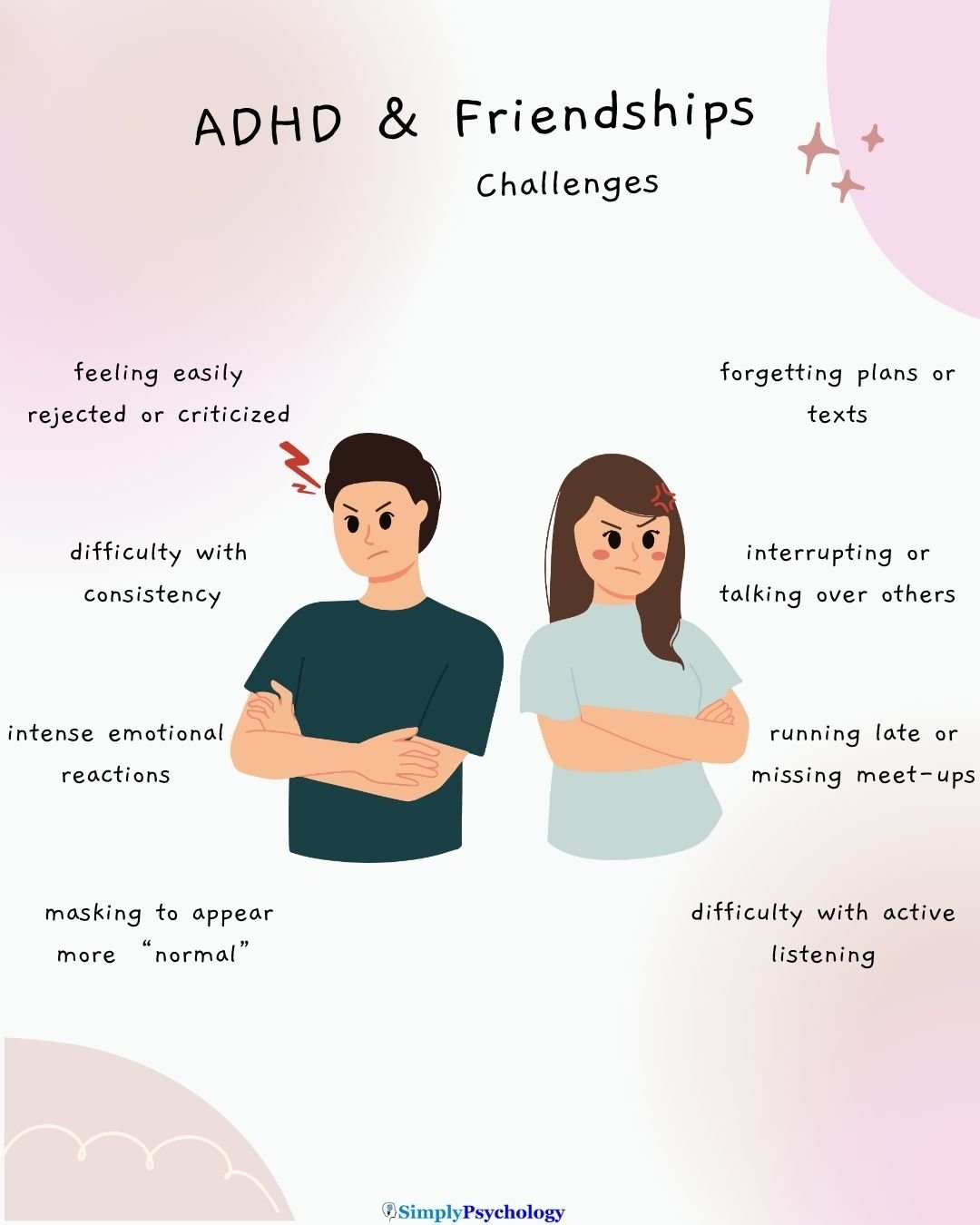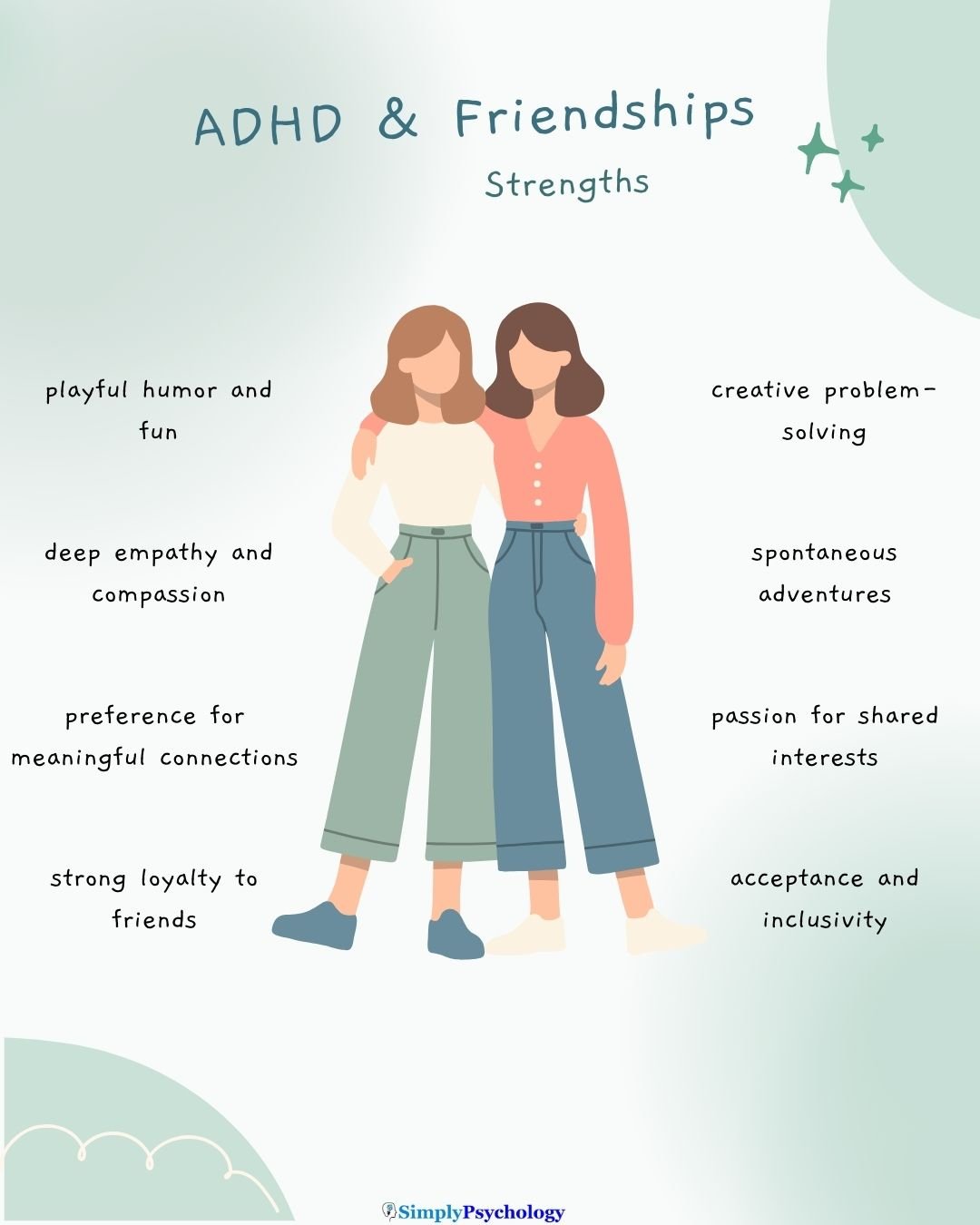Friendships can feel harder to manage with ADHD. Challenges like forgetfulness, rejection sensitivity, or impulsivity may strain relationships, but ADHD also brings strengths—such as creativity, humor, and loyalty—that make relationships deeply rewarding.

Key Takeaways
- Challenges: ADHD can make friendships harder through forgetfulness, impulsivity, and rejection sensitivity, which may cause misunderstandings or tension.
- Strengths: Many people with ADHD bring creativity, humor, and deep loyalty to their relationships, making friendships vibrant and meaningful.
- Strategies: Using reminders, clear communication, and realistic expectations can help maintain consistent and supportive connections.
- Support: Friends who understand ADHD and set healthy boundaries can strengthen relationships while avoiding frustration or imbalance.
- Resources: Therapy, coaching, or ADHD peer groups can provide guidance and community for building lasting social confidence.
How ADHD affects friendships
ADHD significantly impacts friendships due to its core symptoms and how these are perceived by others.
ADHD Symptoms in Social Situations
- Distractibility and missing social cues: Individuals with ADHD often struggle with active listening and maintaining focus in conversations, which can lead to missing important details or social cues.
- Impulsivity and interrupting conversations: Impulsive behaviours, manifesting as interrupting others or blurting out thoughts without considering the impact. This can be misinterpreted as rudeness or a lack of consideration.
- Emotional intensity: Many individuals with ADHD experience emotional dysregulation, meaning emotions can feel overwhelmingly strong and be difficult to control, which could lead to outbursts or arguments.
The “all-or-nothing” nature of ADHD social energy
Social engagement for adults with ADHD can feel like an “all-or-nothing” activity, swinging between being overly social and completely withdrawn.
The sheer mental energy required for daily tasks with ADHD can be exhausting, leading to burnout, anxiety, and isolation, which reduces the capacity for maintaining friendships.
Common friendship struggles with ADHD
Common challenges people with ADHD may struggle with in friendships include:
Communication Difficulties:
- Trouble with Active Listening: Individuals with ADHD may struggle to focus during conversations, leading to missed social cues or important details. This can make it challenging to engage in meaningful dialogue and respond appropriately.
- Impulsivity in Social Situations: This can manifest as interrupting others, oversharing information, or making spontaneous remarks without fully processing them, which friends may misinterpret as rudeness, a lack of consideration, or disinterest. They might blurt out words before fully processing them.
- Inconsistent Communication: Due to hyperfocus on certain activities or forgetfulness, individuals with ADHD may exhibit irregular communication patterns, such as forgetting to respond to texts or calls for days or weeks, which can make friends feel neglected or undervalued. The “out of sight, out of mind” phenomenon is common.
- Difficulty with Small Talk: Many find it hard to engage in or maintain superficial conversations, preferring more meaningful connections.
Consistency and Reliability:
- Cancelling Plans Last Minute: This can be due to “time blindness” or impulsive commitments, leading to others perceiving them as “flakey” or unreliable.
- Difficulty with Follow-Through: Inconsistency and poor follow-through on plans and promises can strain relationships and lead to feelings of guilt and shame for the individual with ADHD.
Emotional Difficulties:
- Emotional Dysregulation: Many experience intense emotions and struggle to regulate their reactions, which can lead to misunderstandings, conflicts, or seemingly unpredictable emotional outbursts.
- Rejection Sensitive Dysphoria (RSD): A profound sensitivity to perceived or actual rejection or criticism is common, affecting up to 70% of individuals with ADHD. This can make it difficult to resolve conflicts (as feedback might feel like a personal attack) and to express their own concerns due to fear of rejection.
- Social Anxiety: Often linked with ADHD, social anxiety can lead to overthinking social interactions, hyperawareness of social cues, and avoidance of social situations altogether, often stemming from low self-esteem and fear of judgment.
- Shame: Many individuals with ADHD experience shame from past criticism about their ADHD-related shortcomings, which can make relationships challenging. They may feel they are “too much” or “not enough”.
Social Perception and Interaction:
- Missing Social Cues: Difficulty reading non-verbal cues, body language, and subtle social signals can lead to awkward interactions or misunderstandings.
- Negative Social Reputation: Children with ADHD can develop a negative reputation early on due to challenging behaviors, which can be resistant to change and lead to peer rejection.
- Perceived as “Different”: Individuals with ADHD often feel misunderstood or “different” from neurotypical peers, contributing to feelings of loneliness and isolation.

Strengths people with ADHD bring to friendships
Individuals with ADHD bring several unique strengths and positive qualities to friendships, enriching relationships in various ways:
- Unique Perspectives and Creativity: ADHD is often linked with flexible thinking and originality, which can offer friends fresh ideas and inventive approaches to problem-solving.
- Energy and Enthusiasm: Some people channel their natural restlessness into excitement and playfulness, making social interactions lively and engaging.
- Spontaneity and Humor: A tendency toward spontaneity can foster openness to new experiences, while a playful sense of humor often helps lighten social situations.
- Empathy and Sensitivity: Many individuals show strong awareness of others’ emotions and a willingness to support friends, sometimes taking risks to help those they care about.
- Hyperfocus and Interests: When deeply engaged, people with ADHD may bring intense focus and passion to conversations, strengthening bonds through shared interests.
- Acceptance and Inclusivity: Personal experiences of difference can foster open-mindedness, making friendships with ADHD individuals supportive and welcoming.
- Value for Depth: Rather than seeking surface-level exchanges, many prioritize meaningful conversations and authentic connections.

Do people with ADHD find it easier to make friends with other neurodiverse individuals?
Yes, individuals with ADHD may find it easier to connect with other neurodiverse individuals.
This is primarily because other neurodivergent people tend to understand and accept their unique traits, which neurotypical individuals might misunderstand or find challenging.
This shared understanding fosters a sense of belonging and reduces feelings of isolation. It also lessens the pressure to “mask” or hide their authentic selves, which can be mentally and emotionally exhausting.
Many individuals with ADHD report that their closest friends also have ADHD. This is because they can relate to shared experiences like interrupting without judgment, as they often exhibit similar behaviours.
Connecting with other neurodivergent individuals, including those who are autistic, can provide a supportive community where one feels truly “gotten”. This common ground makes socializing less intimidating and allows for genuine vulnerability.
Building and maintaining friendships with ADHD
Building and maintaining healthy friendships with ADHD involves intentional strategies across communication, practical tools, and repairing bonds.
Communication and Boundaries
It may be beneficial to be open about your ADHD diagnosis with close friends, as this can foster understanding and patience.
This approach helps to address any shame that individuals with ADHD might feel about their traits.
When specific situations arise, such as being late or forgetting commitments, you can explain that your behaviour is not intentional or personal, but rather a symptom of your ADHD.
In moments of overwhelm, communicating simply and directly, for example, “I’m overwhelmed and need a break,” can be very helpful.
Tools and Strategies
To manage social commitments, consistently use reminders, alarms, or notes in a datebook or calendar for events and birthdays.
Setting realistic expectations about friendships is also crucial; focus on cultivating one or two deep, quality connections rather than attempting to maintain many superficial ones.
Seeking out understanding peers, especially other neurodivergent individuals, can lead to more supportive and accepting friendships.
Repairing and Strengthening Bonds
When mistakes occur, such as impulsive remarks or forgetfulness, offering prompt and sincere apologies is vital. This helps to mitigate negative impacts and rebuild trust.
Furthermore, turn misunderstandings into learning opportunities by gently explaining how certain behaviours might affect others, fostering mutual understanding and strengthening the relationship through open dialogue.
Support a friend who has ADHD
Supporting a friend with ADHD involves a blend of empathy, patience, and clear communication.
Understanding ADHD Behaviours
Recognising that many ADHD behaviours are symptom-driven rather than intentional is crucial. For instance, forgetfulness, chronic lateness, or interrupting can stem directly from core ADHD symptoms.
Learning about these unique challenges helps to foster greater understanding and empathy, preventing misunderstandings or the perception of disinterest.
Practicing Patience and Flexibility
Approach situations with patience and understanding, recognizing that behaviors like inconsistent communication or missing social cues are often ADHD symptoms, not personal slights.
Being direct and specific in your communication and providing gentle reminders for plans can be helpful. This means adjusting expectations without labelling behaviours as simply ‘irritating’.
Healthy Boundaries
While supporting a friend, it’s vital to protect your own well-being and avoid overextending yourself.
Recognize that friendships with ADHD can be exhausting. Communicating your own needs and limits helps to maintain a balanced relationship.
Additionally, encouraging professional or peer support if needed, such as therapy, coaching, or ADHD support groups, can provide your friend with valuable resources beyond your individual capacity.
When to Seek Professional or Peer Support
When navigating friendship struggles with ADHD, seeking support can be highly beneficial.
Therapy and ADHD Coaching
If ADHD symptoms are significantly impacting your social life, mental health professionals or ADHD coaches can provide crucial support.
Cognitive Behavioral Therapy (CBT) can help address social challenges related to ADHD, helping individuals identify and change thought patterns and behaviours that affect relationships.
Coaching can help build and maintain friendships, offering guidance on managing ADHD traits and teaching adaptive behaviours like staying present in conversations and resisting the urge to interrupt.
Neurodiversity-affirming professionals can also help develop self-advocacy skills and boost confidence.
Peer Groups and Online Communities
Connecting with peer support groups or online communities where individuals share similar experiences with ADHD can be incredibly validating and provide a sense of belonging.
Many individuals with ADHD find it easier to connect with other neurodivergent people who genuinely “get” their unique traits, fostering a more accepting environment.
This allows for the exchange of practical advice and mutual encouragement, reducing feelings of isolation.
Co-Occurring Challenges
It’s important to seek support when co-occurring challenges like anxiety, depression, or rejection sensitivity (RSD) amplify social difficulties.
ADHD and social anxiety often go hand-in-hand, making social interactions overwhelming due to overthinking and fear of judgment.
RSD, which affects many with ADHD, can make perceived or actual rejection feel unbearable, leading to withdrawal or difficulty expressing concerns.
Addressing these underlying issues with professional or peer support can improve overall social well-being.
Refererences
Lenzi, F., Cortese, S., Harris, J., & Masi, G. (2018). Pharmacotherapy of emotional dysregulation in adults with ADHD: A systematic review and meta-analysis. Neuroscience & Biobehavioral Reviews, 84, 359-367. https://doi.org/10.1016/j.neubiorev.2017.08.010

